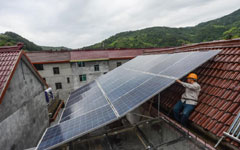Guaranteed tariffs and subsidies support distributed generation projects, which can help reduce pollution and excess inventories, reports Xie Yu in Shanghai
Jason Inch, a Canadian scholar living in Shanghai, just installed a "personal power station" on the roof of a 1930s-era building in the city center.
The 1.5-kilowatt, six-panel solar system can offset the building's own energy use significantly and sell its excess electricity to the grid at a preferential rate of 0.42 yuan (6.77 cents) per kilowatt-hour under what's known as a feed-in tariff.
|
 |
 |
There's also a clean energy subsidy for solar power of 0.3 yuan per kWh.
The solar panel system will cut the building's consumption of conventionally generated power by one-third and reduce its power bill by about 2,000 yuan annually.
"When I was traveling in Japan and Germany, I saw many solar panels on the roofs. But here in China, where every condition for developing solar energy exists, rooftop solar stations are not so common," Inch said.
But he believes household use of solar energy is set to take off, supported by government policies and increasing public concern about pollution.
A 1.5-kW solar project produces 1 to 1.2 megawatt hours of electricity a year, avoiding the use of 400 kg of coal in thermal power stations and cutting 100 kg of carbon dioxide emissions.
These advantages can be multiplied many times if solar panels are widely installed on China's residential and commercial roofs. Broader use of distributed solar generation would also help cut the huge inventory of solar products in China, no small matter for the many panel makers that need to adjust capacity and stabilize prices.
